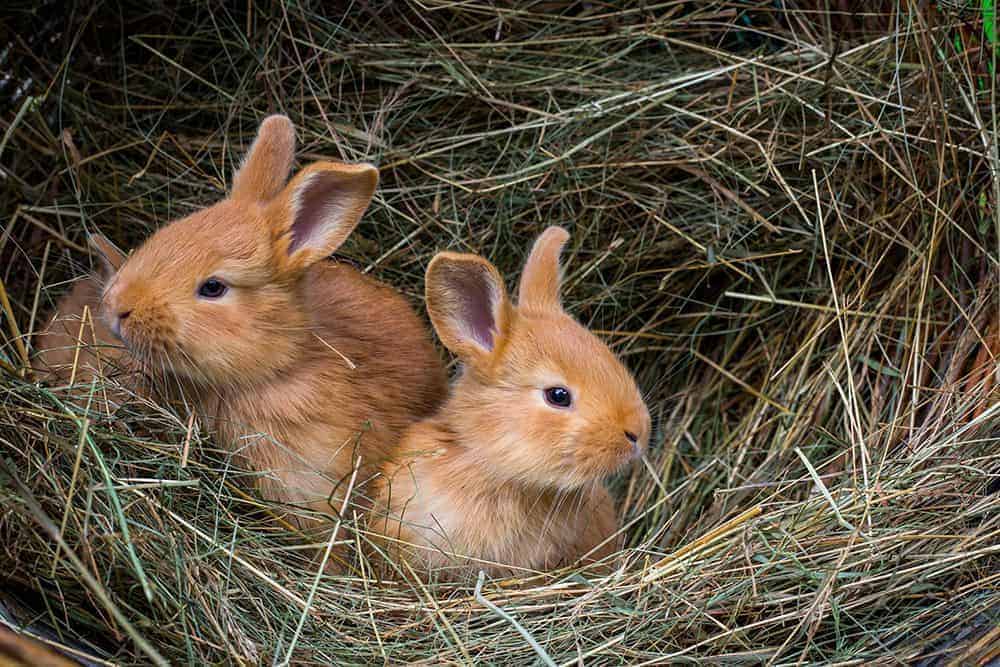
Pets who are kept outdoors rely on their human carers to make sure they don’t suffer because of the changing of the seasons. While rabbits cope with cold weather quite well, guinea pigs don’t like it all and, in winter, ferrets can be prone to getting flu. Find out what you need to do to keep small animals warm and healthy.
RABBITS
Rabbits are quite good at managing colder temperatures, but they need some human help. In the wild, they’d be snuggled away in an underground warren, protected from the worst of the weather. Pet rabbits should ideally be housed in a shed or outbuilding during the winter, with space to run around if it’s too cold or wet outside. If this is not possible, then it’s essential to ensure that their hutch is winter-proof and placed in a sheltered area, away from wind and driving rain.
- Check the roofing felt to make sure it’s completely watertight and that all the walls are in good condition, with no water staining that might suggest that rain is seeping in from under the roof. Make sure the hutch is always raised from ground level, on bricks or a frame, to allow air to circulate and prevent damp entering from below.
- Extra insulation will be required in the form of some kind of hutch cover. You can buy these from pet retailers, or make your own using tarpaulin or old carpets covered in a weatherproof outer layer. Your rabbits will still need fresh air, so you need to create a cover that provides protection from cold and wind, but provides good ventilation.
- Insulate the floor of your rabbits’ sleeping box area with thick layers of newspaper, which you should change daily. Pile extra bedding hay on top for them to snuggle up in.
- During really cold weather, provide a couple pet-safe heated pads that you can warm up in the microwave each evening before placing in their hutch for them to lie on.
DID YOU KNOW?
Rabbits kept outdoors shed their light summer coats and grow thicker fur to protect them from the elements. Indoor bunnies don’t do this.
- Check water bottles several times a time to make sure the water is not too cold or has frozen. Also check the metal spout hasn’t iced up. Your bunnies will need more food in the winter in order to maintain their body temperature and condition, so remember to allow for this when allocating their daily nuggets, fresh greens and feeding hay.
- Rabbits still need regular exercise during the winter, so find time during the warmer parts of the day to let them have a runabout in the garden, or allocate a room indoors (that’s not too warm) where they can stretch their legs every day.
GUINEA PIGS
Guinea pigs don’t do well in cold weather and it’s much better to bring them inside – so see if you can find a cosy space for them in a shed, a porch or utility room. If this is just not possible, then, just as with rabbits, you need to give their accommodation a winter health check.
- First, check that their hutch is water and wind proof. You’ll need to cover it at night, or during really bad weather, with a hutch cover or an old blanket and tarpaulin – always ensuring that there’s just enough space for fresh air to circulate.
- Insulate the inside of the hutch with thick newspaper, changed daily, and lots and lots of bedding hay. Microwaveable pet-safe heat pads are also a good idea to provide extra warmth. Guinea pigs will also need a chance to exercise in their run – but don’t let them get wet and cold – or in an indoor area.
- Guinea pigs need more calories to keep them warm in winter, so give them lots of good quality feeding hay to munch on as well as their nuggets. Don’t forget to check their water bottle several times a day to ensure it hasn’t frozen up.
FERRETS
Ferrets are actually more tolerant of the cold than they are of heat, but they still need extra help to stay warm and comfortable in winter.
- Outdoor cages ideally need to be inside a shed, but if this isn’t possible, place them in a sheltered spot, with a cover on at night, and a cosy bedding box inside to sleep in. Your ferrets will also need cleaning out daily to keep things dry – a damp environment in freezing weather will affect their health.
- As with other outdoor pets, regularly check water supplies aren’t frozen. Your ferrets will also need more calories to keep warm so give them extra rations of ferret food.
- If it snows, you can safely let your ferret out to play for around 10 minutes – many ferrets love tunnelling in the snow – but keep a close eye on them or they might do a disappearing act. Keep snowy playtimes short so your ferret doesn’t run the risk of getting too wet and cold.
- Ferrets can’t catch a cold but they can get a form of influenza which can be passed from human to ferret and ferret to human. If you think you or anyone else in the house has a bout of flu, keep them well away from your ferrets or they could pass the virus on, which could make your ferrets very poorly. Healthy animals can normally fight it off, but older and younger ferrets may find it difficult to recover and should always be taken to the vet for treatment.
Sources: bluecross.org.uk, pets4homes.co.uk














